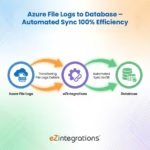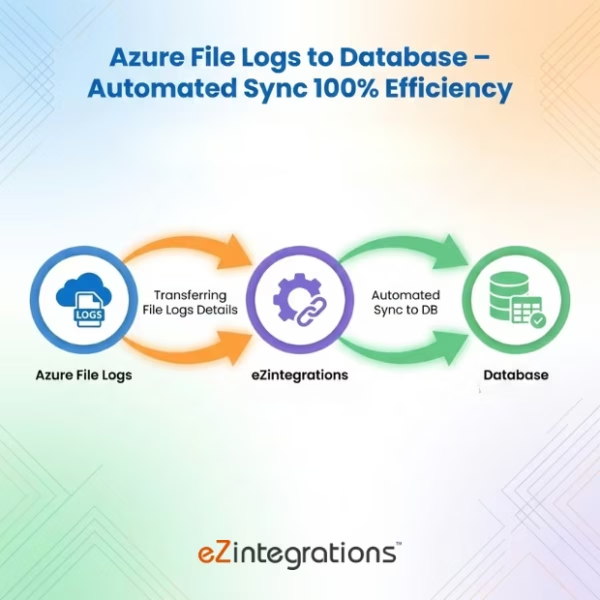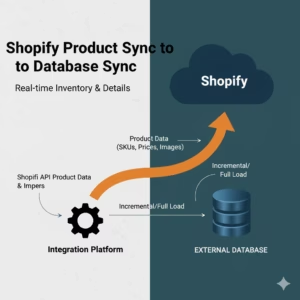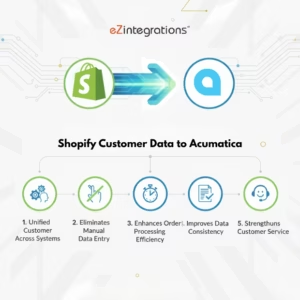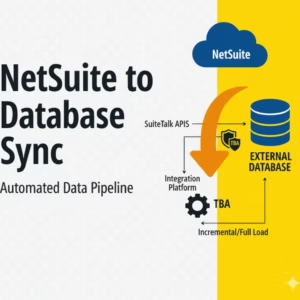Azure File Logs to Database –Automated Sync 100% Efficiency
$0.00
| Workflow Name: |
Azure Storage File Action Logs Automation |
|---|---|
| Purpose: |
Automate extraction and syncing of Azure Storage file activity logs to SQL Server |
| Benefit: |
Accurate audit trails, centralized logs, improved compliance visibility |
| Who Uses It: |
Cloud admins; security teams; compliance officers |
| System Type: |
Workflow Automation; Cloud Logging |
| On-Premise Supported: |
Yes |
| Supported Protocols: |
HTTPS; REST |
| Industry: |
Cloud, Compliance, IT |
| Outcome: |
Centralized logs; stronger governance |
Table of Contents
Description
| Problem Before: |
Manual log reviews caused delays, led to incomplete audits, and resulted in poor visibility into file activities. |
|---|---|
| Solution Overview: |
Captures Azure Storage file events and securely loads them into SQL Server |
| Key Features: |
File upload/modify/delete capture; transformation; SQL sync; automation |
| Business Impact: |
Better governance; 3x faster audits; real-time visibility |
| Productivity Gain: |
3x more events processed per analyst |
| Cost Savings: |
40% reduction in manual log review effort |
| Security & Compliance: |
Ensures governance and regulatory compliance |
Azure File Logs to Database
Streamline the entire Azure File Logs to Database process by automating the extraction, processing, and synchronization of file activity logs from Azure Storage. This fully automated, no-code workflow ensures that every upload, modification, or deletion event is accurately captured and transferred to your SQL database with 100% reliability—eliminating manual tracking and minimizing errors.
Smart Log Processing & Data Validation
Using intelligent parsing and validation, the system captures detailed Azure file action logs including file uploads, updates, deletions, and access information. It cleans, structures, and formats the logs before syncing them to SQL Server, ensuring accurate auditing, improved compliance visibility, and seamless database reporting.
Available on Microsoft Marketplace
eZintegrations automation solutions are available on the Microsoft Marketplace, enabling organizations to easily discover and deploy enterprise-grade workflows within the Microsoft ecosystem. The Marketplace listing simplifies procurement, aligns with Microsoft security and compliance standards, and accelerates adoption for teams automating identity, access, and data synchronization processes. Learn more on the Microsoft Marketplace or visit https://marketplace.microsoft.com/en-us/marketplace/apps?search=eZintegrations&page=1.
Watch Demo
| Video Title: |
Integrating Azure file logs to SQL Database |
|---|---|
| Duration: |
03:41 |
Outcome & Benefits
| Time Savings: |
3x faster audits |
|---|---|
| Cost Reduction: |
40% lower audit workload |
| Accuracy: |
90% increase in audit completeness |
| Productivity: |
3x more processed logs |
Industry & Function
| Function: |
Cloud Audit; File Activity Monitoring |
|---|---|
| System Type: |
Workflow Automation; Cloud Logging |
| Industry: |
Cloud, Compliance, IT |
Functional Details
| Use Case Type: |
Cloud Storage Audit |
|---|---|
| Source Object: |
Azure File Event Logs |
| Target Object: |
SQL Server Audit Tables |
| Scheduling: |
Hourly / Real-time |
| Primary Users: |
Cloud Ops, Compliance, Security |
| KPI Improved: |
Audit accuracy; time saved; visibility |
| AI/ML Step: |
Anomaly detection on user activity patterns |
| Scalability Tier: |
Enterprise |
Technical Details
| Source Type: |
Azure Storage Logs |
|---|---|
| Source Name: |
Azure Storage Accounts |
| API Endpoint URL: |
/api/v1/azure-file-logs |
| HTTP Method: |
GET |
| Auth Type: |
Azure AD OAuth |
| Rate Limit: |
Azure governed |
| Pagination: |
Cursor-based |
| Schema/Objects: |
File events; metadata; user actions |
| Transformation Ops: |
Log normalization; event mapping; enrichment |
| Error Handling: |
Alerts; retry; exception logging |
| Orchestration Trigger: |
Scheduled or event-driven |
| Batch Size: |
500 events |
| Parallelism: |
5 threads |
| Target Type: |
Database |
| Target Name: |
Microsoft SQL Server |
| Target Method: |
Upsert |
| Ack Handling: |
SQL commit validation |
| Throughput: |
1000 events/min |
| Latency: |
1?3 seconds per event |
| Logging/Monitoring: |
Dashboard; alerts; cloud logs |
Connectivity & Deployment
| On-Premise Supported: |
Yes |
|---|---|
| Supported Protocols: |
HTTPS; REST |
| Cloud Support: |
Azure |
| Security & Compliance: |
Ensures governance and regulatory compliance |
FAQ
1. What is the goal of Azure File Logs to Database integration?
The goal is to automatically capture file action events from Azure Storage (uploads, modifications, deletions) and synchronize them to a SQL database for centralized auditing and reporting.
2. Which file events and formats are supported?
The system captures Azure Storage file events (upload, modify, delete, access) and processes log records regardless of source format, normalizing them for database ingestion.
3. Can logs be synced in real-time or scheduled batches?
Yes. The integration supports real-time event-driven sync as well as scheduled or on-demand batch processing to fit operational needs.
4. What happens if a log record fails to process?
Failed records are logged and retried automatically; alerts notify administrators and problematic entries are queued for manual review.
5. Does this support high-volume or bulk log processing?
Yes. The workflow is designed for high throughput and can process large batches of events (hundreds to thousands per minute) while preserving accuracy.
6. What are the main benefits of automating Azure file logs to a database?
Centralized audit trails, faster and more accurate compliance reporting, improved security visibility, reduced manual effort, and faster incident investigation.
Case Study
| Customer Name: |
Global Technology Enterprise |
|---|---|
| Problem: |
Insufficient visibility into Azure Storage file activity |
| Solution: |
Automated Azure log capture and SQL sync |
| ROI: |
Faster audits, fewer compliance gaps |
| Industry: |
Cloud, Compliance, IT |
| Outcome: |
Centralized logs; stronger governance |
